Complete Solutions to PRACTICAL SKILL BASED QUESTION WITH ANSWERS of chapter ELECTRICITY of Class 10 book with complete answers and questions
| Class 10 | PHYSICS |
| Chapter | ELECTRICITY |
| KUMAR PRAKASHAN | PRACTICAL SKILL BASED QUESTION WITH ANSWERS |
| Number Of Questions | 20 |
| Academic Year | 2023-24 |
The scales of an ammeter and a voltmeter are shown below:
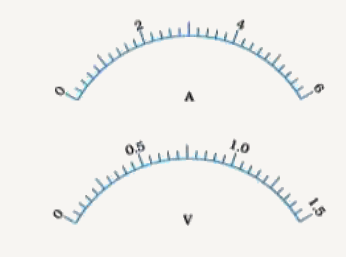
What is the range of the ammeter and the range of the voltmeter?01:18View SolutionThe scales of an ammeter and a voltmeter are shown below:
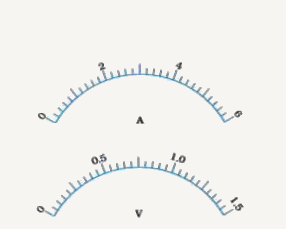
Find the least count of the ammeter and the voltmeter.02:01View SolutionSee the figure given below and find the readings of ideal ammeter and ideal voltmeter.
(There is no zero error.)
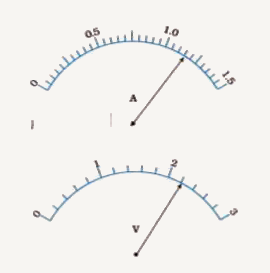 02:00View Solution
02:00View SolutionIn a given ammeter, a student observes that the needle indicates 17 divisions in the ammeter when performing an experiment to verifY Ohm.s law. If the ammeter has 10 divisions between o and 0.5 A, then what is the value of 17 divisions?
02:11View SolutionFour resistors, each of `10 Omega` are connected to form a square as shown in the given figure. Find the eqUivalent resistance between the opposite corner A and C and between two points on anyone side (AB).
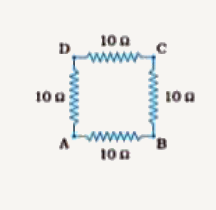 02:47View Solution
02:47View SolutionIn the circuit shown in figure given below and find the current recorded by the ammeter (A).
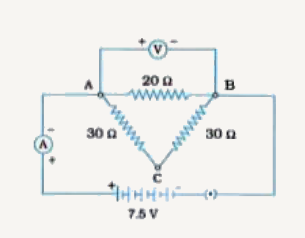 01:46View Solution
01:46View SolutionRead the following information:
( 1 ) The resistivity of copper is lower than that of aluminium which in turn is lower than that of constantan.
( 2) Six wires labelled as A, B, C, D, E and F have been designed as per the following parameters:
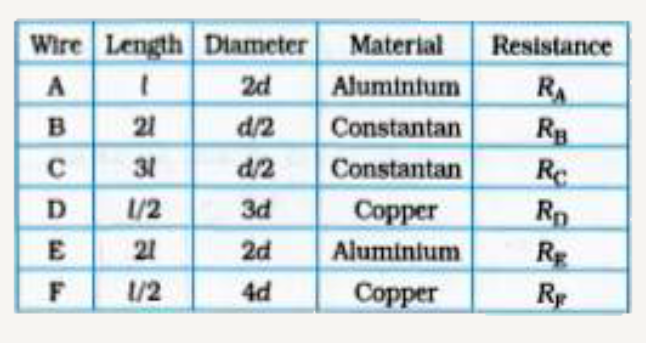
Answer the following questions using the above data:
Which of the wires has maximum resistance and why?03:05View SolutionRead the following information:
( 1 ) The resistivity of copper is lower than that of aluminium which in turn is lower than that of constantan.
( 2) Six wires labelled as A, B, C, D, E and F have been designed as per the following parameters:
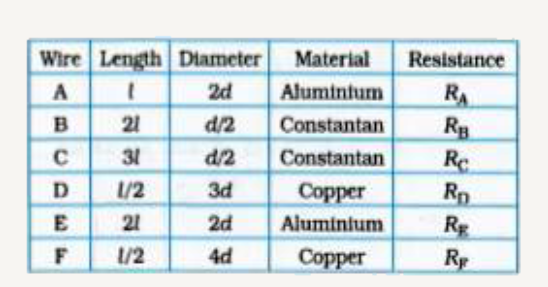
Answer the following questions using the above data:
Which of the wires has minimum resistance and why?02:44View SolutionRead the following information:
( 1 ) The resistivity of copper is lower than that of aluminium which in turn is lower than that of constantan.
( 2) Six wires labelled as A, B, C, D, E and F have been designed as per the following parameters:
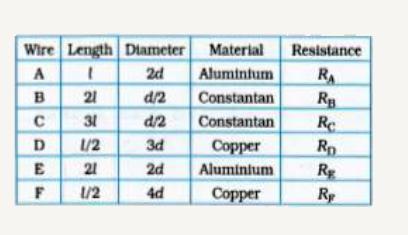
Answer the following questions using the above data:
Arrange `R_A , R_B and R_C` in ascending order of their values. Justify your answer.02:14View Solutionn resistors, each of resistance R are first connected in series and then in parallel. What is the ratio of the total effective resistance of the circuit in the series to the parallel combination?
01:57View SolutionFind out the readings of ammeter and voltmeter in the circuit given below:
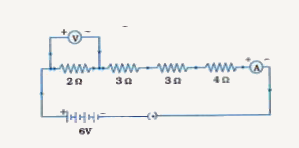 01:57View Solution
01:57View SolutionIn the given circuit diagram, calculate:
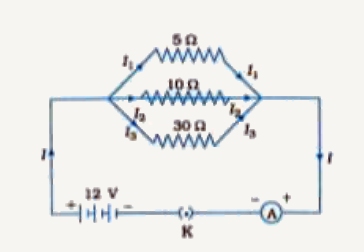
the value of current through each resistor01:23View SolutionIn the given circuit diagram, calculate:
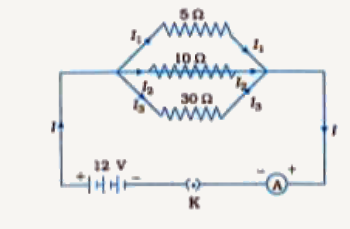
the total current in the circuit01:59View SolutionIn the given circuit diagram, calculate:
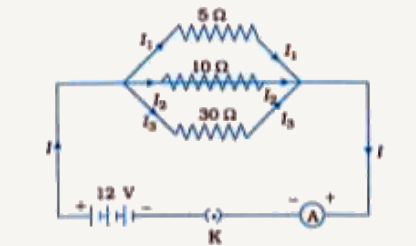
the total effective resistance of the circuit.01:14View SolutionShow four different ways in which three resistors of .r. ohm, each may be connected in a circuit. In which case is the eqUivalent resistance of the combination:
( 1 )Maximum?
( 2 ) Minimum?04:04View SolutionFind the current drawn from the battery by the network of four resistors shown in the figure.
 View Solution
View SolutionFind the equivalent resistance across the ends A and B of this circuit.
View SolutionFive resistors areconnected in a circuit as shown. Find the ammeter reading when the circuit is closed.
 View Solution
View SolutionDraw a diagram of an electric circuit containing a cell, a key, an ammeter, a resistor of `2Omega` in series with a combination of two resistor (`4Omega` each) in parallel and a voltmeter across the parallel combination.
Will the potential defference across the `2 Omega`resistor be the same as that across the parallel combination of `4 Omega`resistors ?Give the reason.04:24View SolutionA current of 1A flows in a series circuit containing an electric lamp and a conducor of `5 Omega` connected to a 10V battery. Calculate the resistance of the electric lamp.
Now if a resistance `10Omega` is connected in parallel with this series combination, what change (if any)incurrent flowing through `5Omega` conductor and potential difference across the lam will take palce ? Give the reason.06:18View Solution
PRACTICAL SKILL BASED QUESTION WITH ANSWERS questions and complete solutions for chapter ELECTRICITY of KUMAR PRAKASHAN of Class 10
All Exercises from KUMAR PRAKASHAN Class 10 PHYSICS ELECTRICITY
- ADDITIONAL QUESTION AND ANSWERS (additonal information :)
- ADDITIONAL QUESTION AND ANSWERS (Give scientific reasons for the following statements :)
- ADDITIONAL QUESTION AND ANSWERS (Solve the following examples:)
- ADDITIONAL QUESTION AND ANSWERS (State at least three points of difference between the following terms / quantities: )
- OBJECTIVE QUESTIONS AND ANSWERS (Answer the following questions as directed (Miscellaneous):)
- OBJECTIVE QUESTIONS AND ANSWERS (Answer the following questions in one word/ sentence:)
- OBJECTIVE QUESTIONS AND ANSWERS (Choose the correct option from those given below each question: )
- OBJECTIVE QUESTIONS AND ANSWERS (Fill in the blanks: )
- OBJECTIVE QUESTIONS AND ANSWERS (Match the following:)
- OBJECTIVE QUESTIONS AND ANSWERS (State whether the following statements are true or false: )
- PRACTICAL SKILL BASED QUESTION WITH ANSWERS
- QUESTIONS AND ANSWERS
- QUESTIONS AND ANSWERS (INTEXT QUESTIONS)
- QUESTIONS AND ANSWERS (MORE TO KNOW)
- QUESTIONS AND ANSWERS (TEXTBOOK ILLUSTRATIONS)
- TEXTUAL EXERCISE
- VALUE BASED QUESTIN WITH ANSWERS
